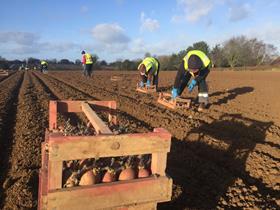
Immigration from Romania and Bulgaria to the UK has risen to its highest level on record following the Brexit vote, but unfavourable exchange rates are making fresh produce recruitment from Poland increasingly challenging, producers have revealed.
Figures from the Office for National Statistics (ONS) show that immigration from the two countries, known as EU2 nations, went up by 19,000 to 74,000 in the three months following the referendum on 23 July.
However, the number of migrants in the UK from the so-called EU8 countries – namely Czech Republic, Estonia, Hungary, Latvia, Lithuania, Poland, Slovakia and Slovenia – fell by 10,000. Emigration away from the UK increased by 12,000 to 39,000 from migrants of these nationalities.
The ONS described the rise in EU2 migrants as the “highest estimate recorded” but warned that it was too early to say what effect the vote would have on immigration in the longer-term.
The figures would seem to suggest that while some Polish and other EU8 nationals are being discouraged from remaining in the UK by the current strength of the Polish economy and unfavourable exchange rates following the EU referendum; Romanians and Bulgarians, whose domestic economies are weaker, still have lots to gain by working in the UK.
When it comes to Polish workers, a recent change in Polish child benefit law could also be a factor, with the Polish government beginning in July 2016 to pay families 500zl (£98.02) a month for every second and subsequent child they have.
This is a large increase from the former policy of paying out 118zl (£23.13) per child to families earning less than 675zl (£132.50),but the new policy places limits on the amount of time that a family's parents may work abroad if they wish to quality for the benefit.
In line with these trends, some fresh produce companies such as the Jersey Royal Company are adapting their recruitment strategy and beginning to hire Romanians for the first time. The business, which still relies on Poland for around 70 per cent of its workforce, has hired 40 Romanian labourers to pick its potatoes this year, tapping into a Romanian labour stream.
“This year, for the first time in a long time, we have a lot of new people working for the business,” said managing director David Rankin. “Because of the Polish economy and the strength of the euro against the pound, quite a few of our Polish workers have not returned this year but we’ve tapped into quite a good Romanian labour stream. We’ve got about 40 Romanians here for the first time and that’s working out well.”
The company has taken the workers from its sister company Rowe Farming in Cornwall, which hires around 800 seasonal workers from both Romania and Bulgaria. It has also made a more concerted recruitment effort in mainland Portugal and the Portuguese island of Madeira.
Sales and marketing director William Church added: “We’ve had to work a bit harder with our recruitment from Poland. We’ve traditionally recruited from one particular agricultural area of the country but we’re now having to work this area a bit more and extend outside of it to encourage workers to come over.”
The rough split of workers in the business is now 70-75 per cent Polish, 15 per cent from Madeira and mainland Portugal, and around 10 per cent Romanian.
The immigration rise from Romania and Bulgaria comes in the context of the government’s decision to grant EU2 workers full access to the UK labour market from 1 January 2014, however this could be under threat when Britain leaves the EU.
The NFU is calling for the reintroduction of a labour programme similar to the Seasonal Agricultural Workers scheme, which was controversially scrapped in 2013. Under the former agreement, fresh produce growers could employ migrant workers from Bulgaria and Romania as seasonal workers for up to six months at a time.



